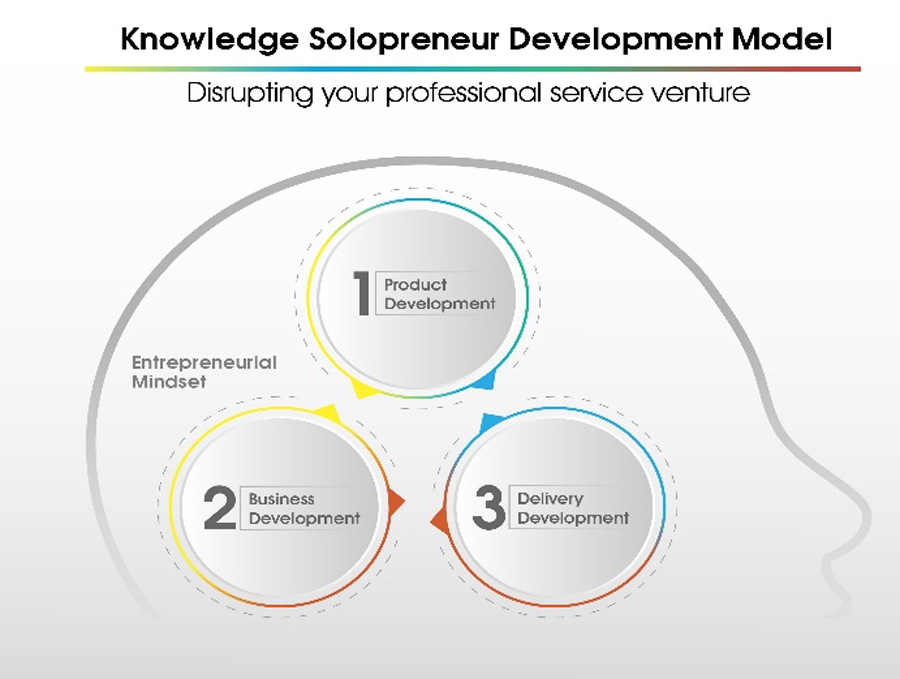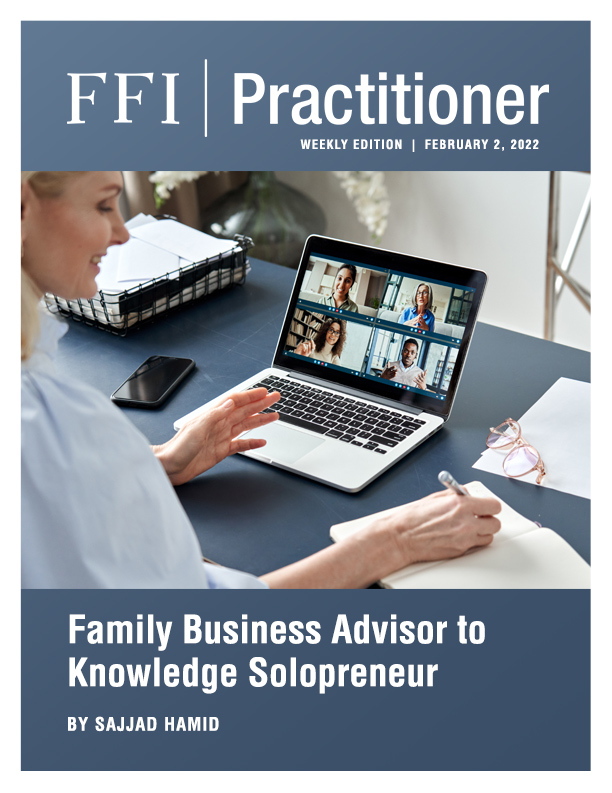
The pandemic aside, the global environment is transitioning from the third economy (knowledge) to the fourth economy (entrepreneurship). The consulting industry and its complementary services (training, mentorship, coaching, and therapy) are ripe for disruption. There is an opportunity to merge the previous model with the new paradigm to create an entrepreneurial service business—as some farmers in the first economy (agrarian) did not die off, they instead embraced the second (mass production) economy. They used mechanization, inorganic fertilizers, and pesticides to trigger a new era in agriculture, which resulted in lower prices and improved quality. Advisors can also use the best of both the third and fourth economies.
How can a solo practitioner develop a new business model but still be relevant in an industry steeped in tradition that prefers trust above all? Alternatively, for advisors who works at a consulting firm but determine this career path is not heading in the right direction, what options do they have as aspiring entrepreneurs, and how can these advisors develop sustainable businesses entirely on their own with limited resources?
Entrepreneurial mindset
Since I teach entrepreneurship, I believe that almost every field can benefit from a dose of entrepreneurial thinking. The entrepreneurship economy could spur more creativity and innovation, further disrupting our world and releasing higher value than the previous mass-production economy.
At the core of entrepreneurship is mindset, which drives successful ventures, including family firms. It might sound simple to acquire the mindset of an entrepreneur, but if it were so easy, everyone would be an entrepreneur. Think about family enterprise clients; their collective entrepreneurial actions are behind their above-average performance relative to their non-family counterparts. This powerful psychological perspective has lessons for any family business advisor.
With an entrepreneur’s mindset, advisors can craft new products as entrepreneurs do, test them out, find new customers or create new markets, and deliver them, combining expertise with a risk-taking thought process. Accordingly, I’ve developed the Knowledge Solopreneur Development Model, which applies to any knowledge worker or professional who wants to transition to becoming a knowledge entrepreneur.

Micro-entrepreneur advisors should consider targeting smaller family businesses, and they might want to start with small and medium-sized enterprises (SMEs), which constitute the majority of businesses in many countries. While working with larger family businesses may be more lucrative, these businesses may prefer a multi-disciplinary team that a fledgling practice may not yet be able to assemble.
Product development
Entrepreneurs have a different approach to product (or service) development. Most large organizations do market research, then test and launch their offering. Entrepreneurs often use another strategy called the Lean Startup method. Eric Ries popularized this concept: conceive an idea, develop a prototype, get market validation, and launch your product or venture.1 This process may sound simple, yet it is difficult to enact, as evidence suggests that most product or business models fail. These failed attempts can be explained by the conventional approach of creating an offering based on traditional research and then selling it.
It is much easier and cost-effective these days for an advisor to test a product or a new model than it was a few years ago, especially with the use of an LMS. Let’s say that experience has shown that there are five critical areas in family business advising: 1) strategic planning, 2) succession planning, 3) governance, 4) growth, and 5) conflict.
A solo advisor plans to offer a free webinar on strategic planning to prospects and advertise on his or her LinkedIn page. To increase registration, the advisor offers a free eBook on the fundamentals of family business dynamics, and requires registration to the webinar in order to download the book. Now, the advisor can begin building a database, which can later become a community. The advisor’s product is essentially content, but her or she can also get involved in knowledge delivery if the advisor so desires.
Business Development
Having heard from several interested registrants, the solo advisor can now test the waters by, for example, either doing a paid short workshop (selling content) or an advisory project (selling both knowledge and a process). After the free webinar on strategic planning, the advisor discovers that some participants are interested in taking the workshop offered through his or her LMS. The advisor then can host the workshop and afterward, offer a free mentorship engagement to implement the lessons—feedback during and after the sessions reveal some do not have the organizational resources.
Delivery Development
If an advisor is going to provide a training to pave the way to offer a higher-value service later, there is a science and art of teaching and learning, or pedagogy, which can potentially open a new market. While content is king in the online environment, delivering transformative knowledge interventions requires different competencies. However, given that advisors are knowledge professionals, they can acquire this pedagogical competency: it’s called learning!
As with the previous two stages, product refinement is continually taking place Lean Startup style, but solo practitioners should be careful not to spend too much time in product development as it’s possible no one may be interested in their offerings. The process here is iterative, as these ideas are subjected to further experimentation.
Since LMS systems are frequently automated, after completing the workshop, the advisor can follow up, incentivize, sell offers, and conduct market analytics. The great thing about an online business model (it can also be a hybrid) is that it is has a relatively low cost. LMS and social media technologies also offer quick and effective market validation, as well as a way to develop a niche market and avoid the larger consulting firms.
Conclusion
Family business advising is an interdisciplinary field that requires high expertise. However, individual advisors can deepen their offering as a business interventionist (as opposed to a generalist) while staying within their confidence area. The transition from the knowledge economy to entrepreneurship economy and the emergence of Learning Management Systems have opened up new opportunities for advisors who want to become successful knowledge solopreneurs using entrepreneurial marketing in a global environment. The Knowledge Solopreneur Development Model brings a different perspective and a contemporary way to engage family business clients.
References
1The Lean Startup. (n.d.). Retrieved January 26, 2022, from http://theleanstartup.com/




